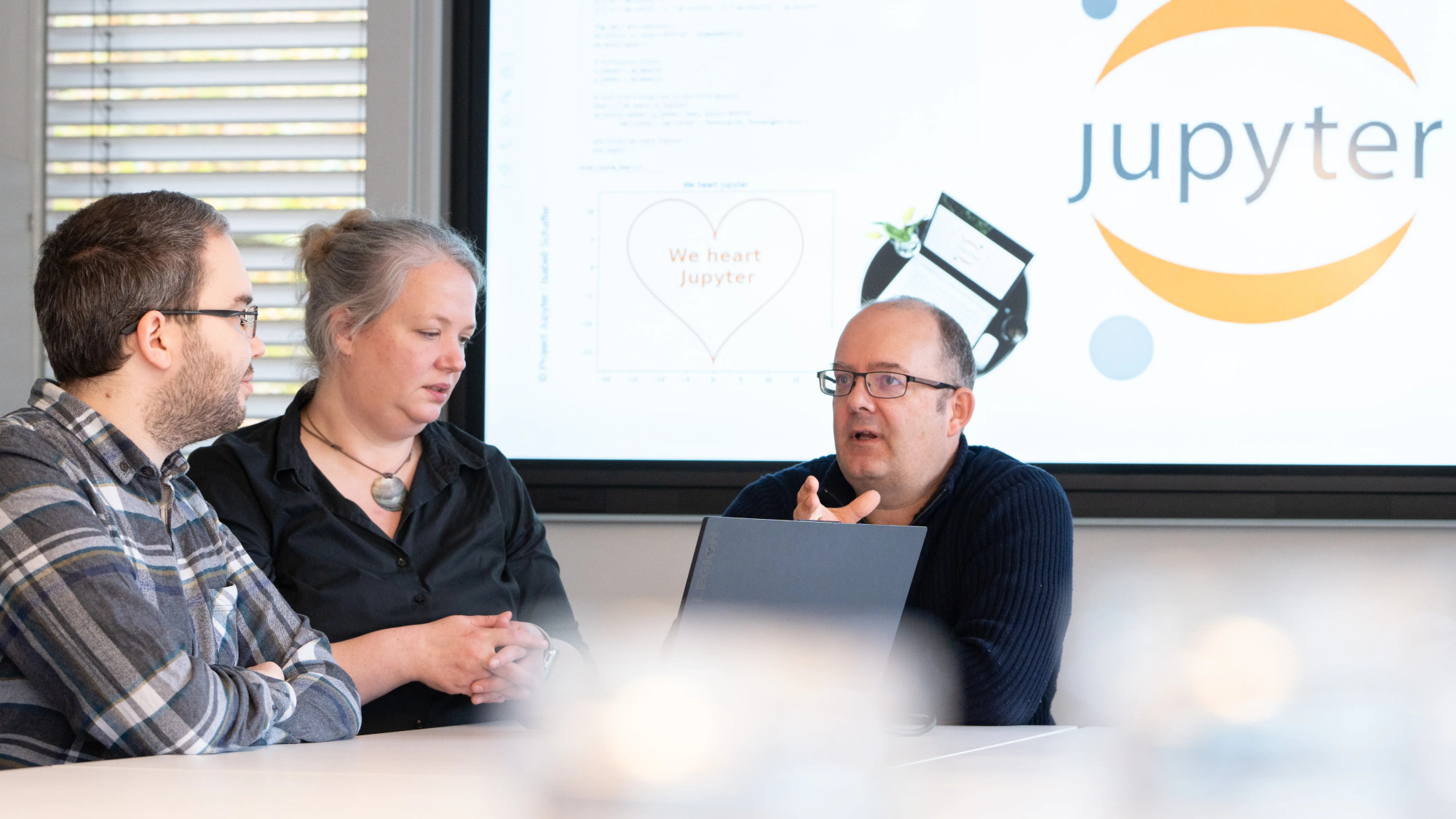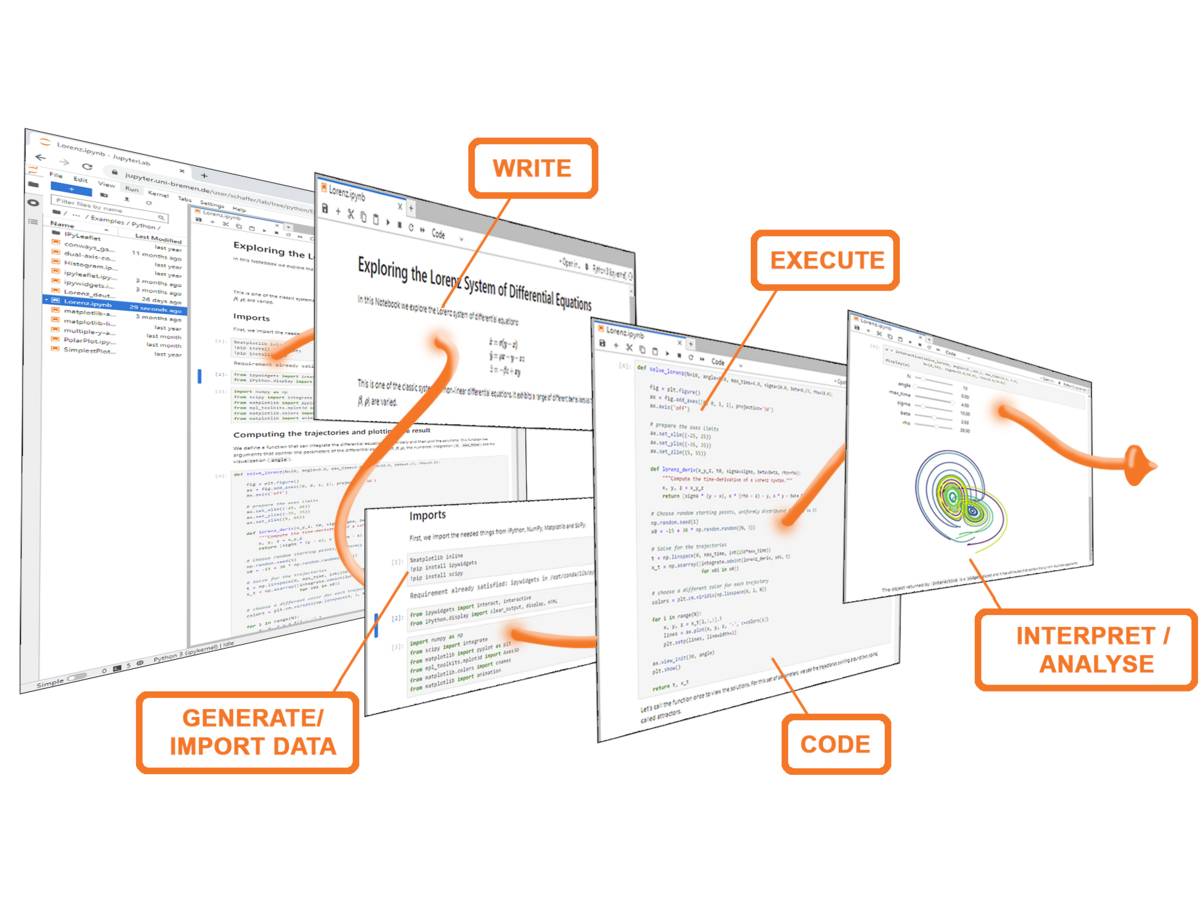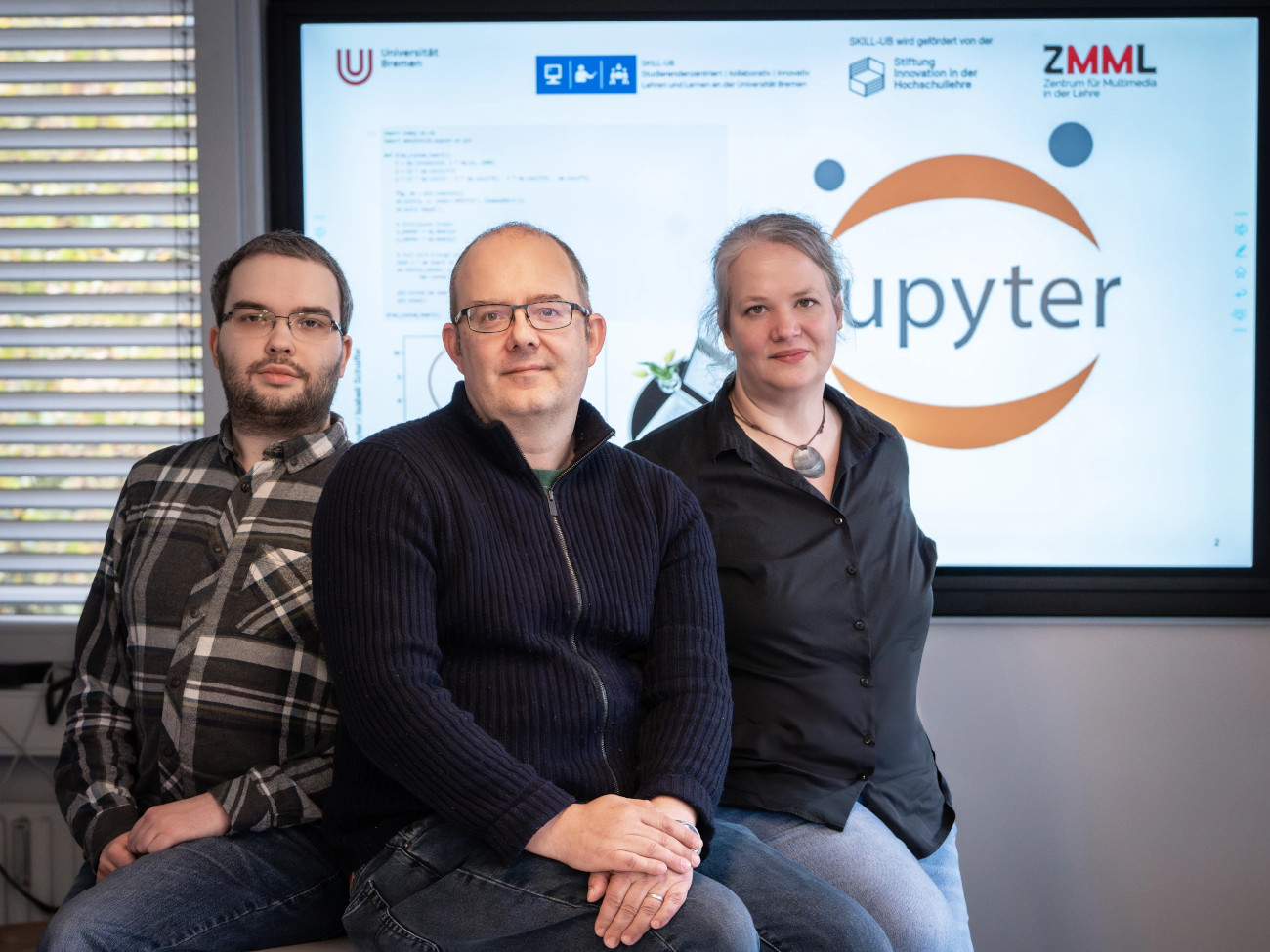
© Annemarie Popp / Universität Bremen
JupyterHub at the University of Bremen – More Digital Opportunities in Higher Education
The digital tool allows students to program directly in their browser, to visualize content, and analyze data
Juliane is supposed to display a color spectrum with an interactive slider using the Python programming language for her computer science seminar. But before Juliane can even start the task, she must overcome a significant hurdle, since Python is not installed yet on her computer. She is also not sure if her laptop has enough computing power for this. Julianne’s fellow student Simon also has difficulties, because he always works with a tablet and doesn’t have a desktop computer. Julianne and Simon are fictional characters, but they represent many students who have to overcome such application problems before they can even begin to deal with the course content. This makes it challenging for teaching staff to facilitate learning as they may have to provide instructions for different operating systems and give installation support before they can teach the course content.
JupyterHub is designed to overcome these challenges. The open source software allows interactive programming and visualization in a browser. Teaching staff can use this digital space to prepare their seminars and make the content available to students. In the Jupyter Notebook workspace, text elements as well as executable codes, videos, interactive graphics, and further links can all be integrated – without complex program installation. “For example, teaching notes can be stored in the Notebook as a digital textbook, in which examples and exercises in various programming languages are directly integrated. Students can then edit the code and immediately see how changing a variable affects the output,” explains Isabell Schaffer. She and her colleague Marcel Meissner are responsible for the tool. Jupyter is anchored in the SKILL-UB project (student-centered, collaborative, innovative teaching and learning at the University of Bremen), which is supported by the Stiftung Innovation in der Hochschullehre Foundation for Innovation in University Teaching and the e-learning center of the University of Bremen (ZMML).
Possibilities, Not Installation Problems
The benefits are obvious, says Isabell Schaffer. “Students no longer have to deal with installation issues because Jupyter can be accessed through the browser and is linked to their university account. All users need is an internet connection.” To provide students with access, teaching staff can create a teaching profile that is linked to their course in Stud.IP. They then upload the materials for the course to this teaching profile. “Up to 40 programming languages can be used, and different program packages, libraries, files, and documents can be linked. The teaching profile is linked to the university accounts of the participating students, so that each student can work in their own copy and make changes,” the SKILL member explains. In addition, collaborative work is possible.

© Jupyter Project / Isabell Schaffer
Even without a specific course, all university members can log in to JupyterHub with their university account and experiment with three programming languages – Python, R, and Java. All users have four gigabytes of storage and one gigabyte of processing power. Another advantage is that the University of Bremen hosts the servers on which the tool runs. This ensures that JupyterHub is secure and compliant with data protection regulations.
Geosciences Take the First Step
The first large-scale test of the digital tool at the University of Bremen was in the SKILL-UB Innovation Labs (InnoLabs), which supports projects in student-centered and innovative teaching. It was initially tested at Faculty for Geosciences (Faculty 5). Professor Heiko Pälike saw an opportunity and seized it, submitting an application for the faculty. “When the University of Bremen announced the InnoLabs, we at the Faculty of Geosciences had just introduced new structures for our bachelor’s and master’s degree programs that also bundled digital skills into teaching modules. It was the perfect time to introduce the Jupyter software and develop teaching materials with learners as a project for Innolabs.” The aim of InnoLabs is to permanently establish a scalable teaching project that can be implemented by everyone. In addition to acquiring the necessary hardware and connecting to Stud.IP, the pilot project also gave students the chance to create their first operating instructions and tutorials. This paved the way for the the Jupyter software to be introduced university-wide for teaching in April 2022.

© Annemarie Popp / Universität Bremen
Heiko Pälike believes JupyterHub is still important and uses it himself in teaching. “JupyterHub extends research-based learning to include collaborative aspects. Another important aspect of research-based learning is the reproducibility of the entire spectrum of data exploration and analysis. Providing our students and teaching staff members interactive and low-threshold access to a script-based programming and visualization environment is therefore highly relevant,” he states. JupyterHub is currently being used at six faculties at the University of Bremen. In the winter semester 2024/25, it will be used in approximately 20 courses, including seminars in Statistics, Computer Science, Data Analysis, and Processing, and for quantitative research in general.
Relevant Beyond the Classroom
JupyterHub is already used by many at the university, and Isabell Schaffer and Marcel Meissner are working on making additional improvements to the tool. “One challenge we still face is how to make submitting completed exercises easier. Teaching staff members encounter this problem in face-to-face teaching as well. With a digital tool, it’s no different,” states the SKILL team member. The possibility of using JupyterHub in research has also been considered, for example as part of the Excellence Strategy. Many universities and research institutes already use the software. This is still a long way off, but not impossible. “A different infrastructure with more storage and computing power would be needed for research. That’s why we haven’t implemented it yet, but there is interest at the university,” Isabell Schaffer explains.
Further Information
The next JupyterHub introductory events will take place on November 18, 2024 at 10:00 a.m. and December 12, 2024 at 1:00 p.m. Additional dates have been scheduled through April. Support for integrating the tool into teaching and learning is available at info@jupyter.uni-bremen.de.
For more information, dates, and instructions, visit the website
This will take you directly to the University of Bremen’s JupyterHub
Information on the Jupyter open source software
Information on the SKILL-UB project and the Innovation Labs (currently in German only)